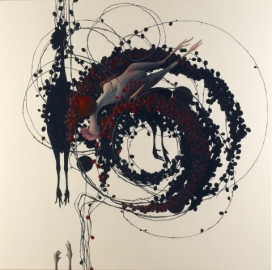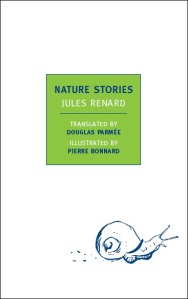
Mia Brownell, Still Life with Chicken Villin Headpiece (2006)
A writer that I will not name (because I’d rather not misrepresent or misremember him) once told me that both T.S. Eliot and Ezra Pound were anti-Semitic, but that Eliot’s poetry was strong when expressing racism, while Pound’s poetry, when it turned to his fascist ideology, was not. I do not know if this is true. Whenever I encounter in their poems something politically or morally objectionable I ask myself: but is this “good” poetry? I can think of at least a handful of poems by each of these poets that I want to remember, but I quickly lose interest in the poems that turn to clichéd stereotypes and strident propaganda. And so, thus far, I have failed to answer this question … while conceding to the more immediate and subjective standards of 1) “do I like it?” and 2) “do I want to read it?”
In my friend’s case, this might be a small gesture toward excusing Ezra Pound of his politics. One which is along the lines of: we don’t need to pay too much attention to Pound’s fascism, that part of his poetry isn’t very good, anyway. The approach seems difficult to defend, and yet there are so many great writers and artists who were or are, in one or more parts of their lives, inarguably monstrous. (The same might be said of most people. I do not think this is a unique feature of artistic personalities.) And so (displaying my friend’s influence, perhaps) I often read while making some assumed moral judgments about the value of the poetry. Poems may be categorized by:
1. Convincing works which advocate for or give voice to good things. (Christopher Smart’s “A Song to David.”)
2. Works created by people who did bad things. (Pretty much anything and everything we do.)
3. Unconvincing works which advocate for or give voice to good things. (Trite little moralisms and juvenile works about the wonderful qualities of one’s grandparents.)
4. Unconvincing works which advocate for or give voice to bad things. (Some of the Pound Cantos.)
5. Convincing works which advocate for or give voice to bad things. (Eliot’s images of Jews.)
While #1 and #2 are comorbid, and while #4 is perhaps the most unpleasant, #5 is most the dangerous. Finally, although I am certain #5 is more dangerous, I find it difficult to distinguish between morally damaged poetry that is unconvincing (#4) and that which is convincing (#5). Frequently, the evil expressed makes the expression itself seem less convincing. In other words, I struggle to separate the medium from the moral. Nonetheless, from time to time, I try. Recently, I decided to apply these judgments to a brief poem by Ted Hughes, “Exits”:
‘We believers shall get away to God
That much earlier if the bomb drops!’ rejoices
Our parson to the old women’s faces
That are cold and folded, like plucked dead hens’ arses.
In many a corner tonight
The rat chews off its paw
And dedicates the other three
To getting away out of it joyfully.
A sudden pinky-blue scowling glistener
The baby balloons out of its mother –
Splitting the tissue of all time, and the tarmac too
Like a mushroom, O genii of the atom.
Marly Youmans, in her expression of disgust, introduced me to the poem and, I fear, I have already given it more attention than she thinks it deserves. (The poem that follows “Exits” is without a doubt far, far more unsettling—plain misogyny, complete with a chorus on the word “bitch.”) But, now that I’m this far in, let’s measure it against the (above) five moral categories.
Is this a poem by a person who did bad things (#2)?
Absolutely, I do not need to read biographies of Ted Hughes, to know this is true.
Is this a poem that expresses bad things, but poorly (#3)?
Ah, now that’s complicated. First, does the poem express bad things? Maybe. Women are at two ends of a complex metaphor. In both cases he uses the bodies of women (“women” in general) as the image of that from which one might want an exit. It would be an understatement to say that these representations are “unflattering.” In the first stanza, Hughes compares the faces of old women to the “arses” of plucked hens. In the third, he uses the image of a baby’s head crowning at birth to show the arrival and detonation of a nuclear weapon. (Think of all the mushroom clouds one sees blooming in slow-mo film.) But are these representations “bad”? Do they help us build a better world? Maybe. Maybe, on the whole, one reads the poem and realizes that this world is not something we should be so eager to exit. Maybe one reads the third stanza and sees a birth that we should work with more diligence to avoid. Perhaps, one might say, Hughes should be excused of his misogyny because he has used it to show us the horror of a nuclear “exit”. Or, more accurately, Hughes has shown us the lifelessness of wanting to leave this world so much that we might wish upon ourselves a nuclear end. Having read of Youmans’ wrath, I am reluctant to say that this is so. Youmans’ disgust with the chicken image is an example of at least one case in which a very skilled reader found the image to be more hurtful than edifying. I will conclude, therefore, persuaded that the poem expresses bad things. But does it do it well?
Is this a poem that expresses bad things in a powerful way (#5)?
Yes, to the bad things; see above. And yes and no to things expressed with poetic power. The three images used in this poem are at once efficacious and cartoonish. (By some aesthetic standards, cartoonish representations are always inferior, mimesis by shorthand, but I’m not sure that I hold to that.) I think that the first two stanzas are difficult to take literally. The rat that escapes without its paw does not hobble away “joyfully”; rather, it limps away like a rat with three good legs and one raw one. Likewise, while the parson’s remark seems a bit ridiculous, and although I have heard equally silly remarks in many sermons, what would be the occasion for the comment? The women, however, are less believable. Most churches have at least a few women with wrinkled or even grouchy faces, but in this scene it seems that the entire congregation is comprised of elderly, “church ladies.” (One must assume that the poet is there too, or at least has reason to own the anecdote; after all, he writes of “our parson.”) In addition to these reasons, I am also inclined to say that the stanza does not work because it has misplaced its focus. It is the exit, the parson’s message, which is the true focus of the stanza, but Hughes diverts our attention to the women’s faces. He makes the problem worse by choosing a distasteful vehicle for his metaphor. In short, one spends far too much time trying to imagine “plucked dead hen’s arses” and not enough time registering the exact “exit” that is recounted in the stanza.
The final stanza, in which the crowning head of a baby is used as the vehicle for a vision of a nuclear explosion, holds more power. Cleverly, it doubles back on itself—an exit shown to us by an entrance—we are exited from the world as the baby exits its mother, as the bomb enters the “tarmac.” But what are we to make of this? Something misanthropic and dark if not disturbingly misogynistic? Let’s not forget that we have, for the most part, all entered this world by “ballooning” out of our mothers, by splitting that “tarmac”—surely Teddy’s mom would not have appreciated this vision. Nor, I hope, would the poet want us to think of his own birth in such terms.
Finally, although I appreciate the cleverness whereby the final stanza revisits the first, I also fail to see how the poem works as a whole. What are we expected to conclude? Silly parsons are suicidal? Rats will do anything to get out of a trap? Old women are not attractive? Babies are deadly? If it’s “nuclear war is bad,” I think Hughes failed to get us there. Rather, the poem confirms the parson’s message. This is a more fitting paraphrase: the poet is looking for an exit and would be willing to chew off a foot to get away; he’d rather have never been born into this awful world, if it weren’t for aging women, he wouldn’t have had to be. So, the poem seems to plead: go ahead and drop the bomb; see if I care.
Read in this way, the poem is a powerful expression of Hughes’ own ugly mood. Perhaps that’s why he left it “uncollected”. Perhaps he too could hear the shrill adolescent tone. Perhaps he feared he’d anger his mother. Most of us will never have an editor to pick through our “uncollected” poems; the cost of being worthy of one is on display here in the Collected poems (Paul Keegan, ed. New York: FSG, 2003).
Therefore, I put this poem somewhere between #4 and #5. If we read it as an anti-nuclear war poem, it’s a four. If we read it as the work of a depressed adolescent, it get’s a five—although it offends more than it hurts. The poem shows the author to be a shallow person, it does not motivate us to be likewise.
 A few weeks ago I finished my first reading of Jules Renard’s Nature Stories (Douglas Parmée, trans. New York: New York Review of Books, 2011). I read a few short chapters every night before bed. Now I am reading Moby Dick. The two works really do not bear comparison–except that that I am reading them in succession. Nature Stories is so happy, unguarded and fearless (in an innocent way) about its contradictions. (For Renard, caging a canary or a bullfinch is a senseless brutality, but there’s no better recreation than shooting hares and partridges.) Renard, like most good writers, is an excellent witness, but he is not a distant one. He simply enjoys stomping around the French countryside and acquainting himself with the local critters, domestic and wild. And yet, his affections are not the principle focus of what he writes; they are communicated incidentally, in passing, or by some magic of tone. For Renard, the countryside is a place of rest; there “nature” is, not without pain, but on the whole, benevolent.
A few weeks ago I finished my first reading of Jules Renard’s Nature Stories (Douglas Parmée, trans. New York: New York Review of Books, 2011). I read a few short chapters every night before bed. Now I am reading Moby Dick. The two works really do not bear comparison–except that that I am reading them in succession. Nature Stories is so happy, unguarded and fearless (in an innocent way) about its contradictions. (For Renard, caging a canary or a bullfinch is a senseless brutality, but there’s no better recreation than shooting hares and partridges.) Renard, like most good writers, is an excellent witness, but he is not a distant one. He simply enjoys stomping around the French countryside and acquainting himself with the local critters, domestic and wild. And yet, his affections are not the principle focus of what he writes; they are communicated incidentally, in passing, or by some magic of tone. For Renard, the countryside is a place of rest; there “nature” is, not without pain, but on the whole, benevolent.

